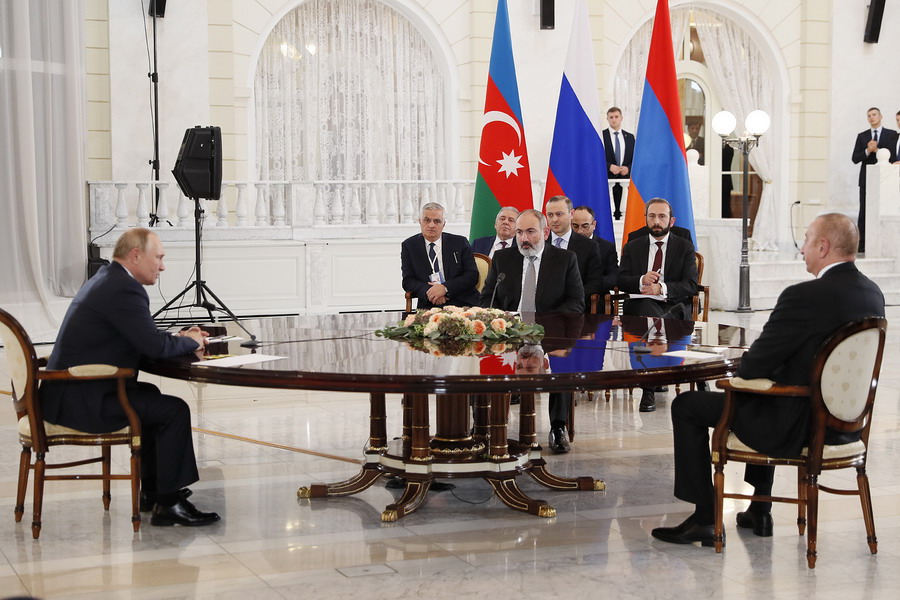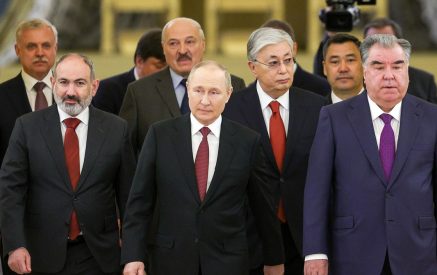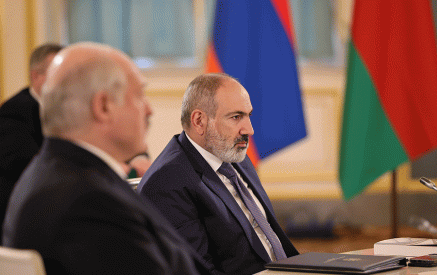by Paul Iddon
In recent weeks, Armenia has ordered air-defense systems and radars from France and was reported to have ordered anti-drone systems from India.
Those orders come amid heightened tensions with neighboring Azerbaijan, with which Armenia has fought several conflicts, including a short clash in September that ended with Azerbaijan conquering the enclave of Nagorno-Karabakh, causing its 120,000 ethnic-Armenian residents to flee.
Read also
The acquisitions are notable not only for their timing but also because they show Armenia is taking tangible steps to lessen its dependency on military hardware from Russia, a longtime ally that has offered Yerevan little support against mounting pressure from Azerbaijan.
Armenia’s six-week war with Azerbaijan in 2020 captured worldwide attention for Azerbaijan’s use of aerial drones. At a press conference to announce the sale in October, France’s defense minister said air defenses were “absolutely key” and that Paris was aiding Yerevan with sales of three Thales GM 200 radars and an agreement on the future delivery of short-range Mistral air-defense missiles.
“Armenia’s choice to order air-defense systems from France is a significant one,” James Rogers, an expert on drones and precision warfare, told Business Insider. “Not only does it highlight to Russia that Armenia has options when it comes to defense cooperation, but it marks a major leap forward in Armenia’s attempts to modernize its military.”
Reports in early November indicated Yerevan was also buying more weaponry from India, including Zen anti-drone systems, which are designed to detect and bring down enemy drones. Armenia previously bought four Indian-made Pinaka multi-barrel rocket launchers in 2022, the first foreign order of that system.
Nicholas Heras, the senior director of strategy and innovation at the New Lines Institute, told Business Insider that Armenia was advancing its foreign and national security policies on two tracks.
“One track is to build defense alliances with more powerful outside actors in Eurasia, and the second track is to improve the Armenian military’s ability to defend against Azeri airpower in tactical engagements,” Heras said. “India, in particular, is a prized defense partner with Armenia because India has a large defense industry that can also arm and improve Russian weapons platforms which Armenia deploys.”
Armenia’s military arsenal has long been predominantly Russian, but Yerevan has attempted to change that as its relations with Moscow have soured, especially after its devastating defeat in the 2020 war, during which Azerbaijan used Israeli- and Turkish-made weapons.
Russia has failed to aid Armenia despite Yereven’s membership in the Moscow-led Collective Security Treaty Organization. In addition to being tied down by the war in Ukraine, Russia is most likely irked by Armenia moving closer to Washington and the West under Prime Minister Nikol Pashinyan, who has long questioned the value of CSTO membership.
“Armenia’s partnership with Russia is at a low ebb, and Pashinyan is pushing forward, slowly but surely, to bring Armenia closer to NATO, including the prospect of normalizing Armenia’s relations with Turkey,” Heras said.
Heras added that over the past two years, the US had been sending “a strong signal” that it “would like to test out the prospect for a more strategic US-Armenian security relationship.”
Washington and Yerevan seemed to demonstrate mutual interest in closer defense relations in September when Armenia hosted a bilateral exercise focused on training for peacekeeping operations.
Eighty-five US troops trained alongside 175 Armenia personnel during the drill, which was “a testament to our longstanding partnership with Armenia and builds upon decades of successful peacekeeping and security cooperation,” the US Embassy in Armenia said in a statement.
Russia, predictably, opposed the exercise, and Yerevan has kept its distance since then. Pashinyan skipped the organization’s summit in mid-November, a move Russia accused the West of orchestrating.
Armenia under Pashinyan has tried to move away from Russia “by building a web of strategic partnerships,” Heras said. “Fundamentally, Pashinyan does not want to depend on Russia to ensure Armenia’s territorial integrity and security, and his effort to build the relationship with the United States works toward this goal.”
Acquiring weaponry from other countries serves a similar purpose, but Armenia’s recent purchases also reflect the sensitivity of its international position.
The Mistral missile has a relatively short range of 4 miles, suggesting the sale is meant to bolster Armenia’s arsenal but was made with potential political backlash in mind. Turkey has criticized French arms sales to Yerevan. (Azerbaijan has also criticized the recent French and Indian arms sales to Armenia.)
Rogers said that “range is important in war” and that it enabled strikes on a wider set of targets. “In order not to destabilize the region or risk an outbreak of hostilities, therefore, Armenia and France have agreed to these short-range yet effective air-defense systems.”
Heras said that the main quandary facing Armenian foreign policy was it could not afford to sever ties with Russia despite recent tensions, but it also could not trust Russia to intervene on its side if there’s another war with Azerbaijan. The need to strike a balance between Russia and new partners while bolstering its small military with limited resources complicates Armenia’s task.
“Armenia needs to purchase weapons that improve its ability to pursue a ‘porcupine strategy,'” making itself a more threatening target for Azerbaijan if the two countries go to war again, Heras said.
Buying French and Indian short-range air-defense weapons that could be used by small infantry units is “a potentially cost-effective way to impose higher costs on Azerbaijan’s drone airpower,” Heras added.
Paul Iddon is a freelance journalist and columnist who writes about Middle East developments, military affairs, politics, and history. His articles have appeared in a variety of publications focused on the region.

























































